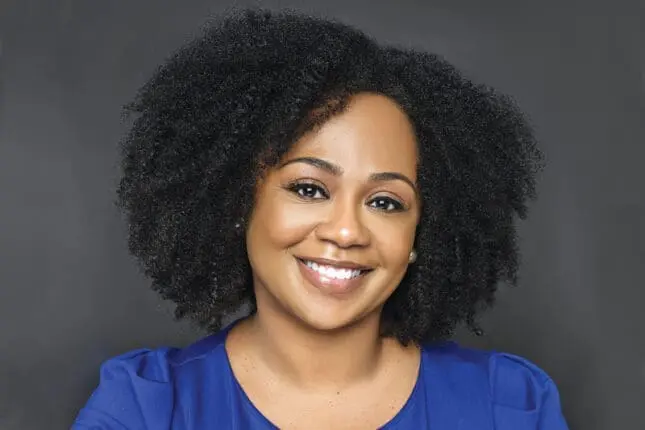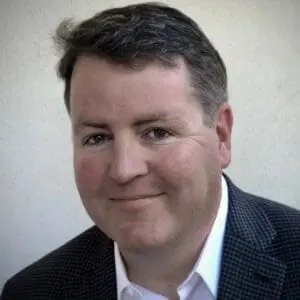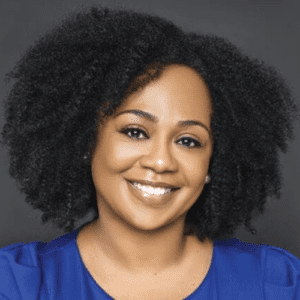As healers, we therapists largely do our work on an individual level, meeting session-by-session with a single client, or perhaps the occasional couple, or even a small group or two. We hold close the belief that, in taking on this admittedly difficult mandate, we can inspire positive change, not just for one person, but perhaps—when it’s all going well—that person’s family, and even their entire community. But if 2020 has shown us anything, it’s just how much work there is to do, especially in providing access to culturally competent mental health education and support for the many people who need it.
Although deeply entrenched disparities in mental health care have long been a concern in the field, events of the last year have launched them into the national conversation. And pioneering clinicians making important changes on a large community level have exploded onto the popular media scene. One of them is Dr. Joy Harden Bradford.
A psychologist based in Atlanta, Georgia, Harden Bradford is the founder of Therapy for Black Girls, an online community where, as the name suggests, young Black women can candidly discuss issues of mental health and, in doing so, work to dispel the stigma that surrounds it. The site, which features a therapist directory, blog, and social network, has been featured in publications such as O, The Oprah Magazine, Forbes, and The Huffington Post. Its eponymous weekly podcast—in which Harden Bradford brings her pop culture savvy and psychological wisdom to bear on issues ranging from sex and “situationships” to anxiety and the psychological impact of racial trauma—has netted more than 13 million downloads.
Here, she shares what her listeners are bonding over and what she sees as a must-do for modern multicultural psychotherapy.
– – – –
Ryan Howes: You reach so many young Black women who have questions about their mental health. What did you think of therapy when you were a young person?
Joy Harden Bradford: I honestly didn’t think of it at all. I don’t remember any conversations about it in my household or at school. A lot of Black people don’t grow up with the idea of therapy, which is part of why there’s still a huge stigma related to mental health services in the Black community. It’s been my experience that, even as we get older and enter into adulthood, there aren’t usually a lot of Black therapists or other therapists of color in places where they should be, like schools and college campuses. If you already feel uncomfortable about the idea of therapy, it may get even worse if you don’t see someone who looks like you providing therapy as you grow up.
My introduction to therapy came when I took a psychology correspondence class in high school, and that’s where I really fell in love with the field. Once I got to college, I had the opportunity to intern with a university organization in New Orleans that provided counseling sessions to students on a sliding scale. I noticed that Black students weren’t coming in for services at the same rate as their white peers, so it felt important to me to run a group—either in the multicultural student center or the housing department, or wherever the Black students were gathered—to give them additional support for the stressors that I knew they were experiencing but maybe didn’t feel comfortable coming to the center itself to talk about.
RH: Can you tell us about your journey from doing that kind of work to now being an influential podcaster?
Harden Bradford: I’m trained as a counseling psychologist, and a large part of that training is escalation prevention. I want to be able to help people talk about their emotions and learn distress tolerance: the kinds of things that prevent a mental health situation from getting worse.
In my case, the response to doing this preventive work has been incredibly positive, and it’s helped me develop my own voice as a psychologist. It got me to the point that I was directing the counseling center at Clark Atlanta University. While working there, I had a 45-minute commute to and from work, and that’s how I fell in love with podcasts: by listening to them in the car.
When you listen to a well-produced podcast, it sounds very easy, right? It sounds like, “Oh, they’re just talking. I could do this.” I was already blogging on the Therapy for Black Girls site, but not with any regularity. So I thought starting a podcast would be another great way for me to share information in a different format.
Also, my husband has a radio background, so I knew he’d be able to edit for me, and that made the barrier to entry really, really low. We started in 2017 and have passed 13 million downloads. As the podcast picked up, it was clear that I needed to devote more time to it. I scaled back my private practice, and now have a small caseload and spend most of my time producing the podcast and managing our therapist directory.
Some episodes are just me talking about something I want to share, but the majority are interviews with other therapists about their specialties. We have conversations about all kinds of things, like emotional eating, relationship concerns, and affirming your queer identity.
We also do episodes called “On the Couch,” where we discuss a fictional Black woman character from pop culture, like Olivia Pope from the show Scandal. We’ll ask, “What might she have talked about in therapy?” I don’t feel comfortable talking about any real clients, but when you talk about a fictional character that lots of people know and love, it brings therapy to life for people who either may be uncomfortable with it or don’t know what people talk about in sessions. They end up thinking: “Oh, I see that in my own life. Who knew I could talk to a therapist about that?”
RH: What do you see as the current state of therapy stigma?
Harden Bradford: I feel that the way everything seemed like it was on fire in 2020 actually helped reduce mental health stigma, because so many people can now use support. It’s almost easier for us to have conversations about mental health when everybody’s trying to figure out how to stay sane in the face of these pandemic pressures.
And then we had the George Floyd incident. Only time will tell whether that’s something that really changed people, especially since racism and police brutality were topics we were already talking about when it happened. But it definitely feels like there’s now more conversation about the way racism impacts mental health in the black community.
RH: So you have this podcast with this big reach and an impressive social media presence, but you also host a community through the site as well. What happens there?
Harden Bradford: The Yellow Couch Collective is our smaller community within Therapy for Black Girls. It’s a cozy corner of the internet for Black women to be in community, be supported, and be themselves. It’s designed to dig deeper into some of the topics from the podcast and assist women in learning skills and strategies to take care of their mental health.
RH: You also discuss the importance of why Black women need to set boundaries. Can you talk about that?
Harden Bradford: Historically, Black women have been raised to feel like we must take on the weight of the world. We’re the ones who are the presidents of the PTA and we’re the ones who’ve got to hold on to the family and run the church committees.
There’s not a lot of emphasis on self-care. Black women are often just giving, giving, giving, without stopping to pay attention to what’s being given to them. I think learning how to say no and setting boundaries in life is something that most people could use, and it’s particularly true with Black women, because of the focus on other people that has been a part of our culture for so long.
Also, a lot of people of color were taught that you’ve got to be twice as good to get half as much respect. The whole idea behind the cultural stereotype of the strong Black woman—that Black women are strong in the face of overwhelming adversity—comes from a place of pain. We’ve had to be strong to survive. Being strong was a survival tactic, which involves cultivating an admirable sense of resilience, but when it becomes overpraised, it makes it difficult for women to show their vulnerability.
This is where the discussion of boundaries comes in—not that it’s easy to set them. So we talk about the consequences that doing things differently could have. It’s important to say, “Yes, you may face losing a friend if you do create a boundary, but it doesn’t mean that you were wrong.”
RH: One of your most popular episodes is called “Hot Girl Summer.” What was that about?
Harden Bradford: Are you familiar with Megan Thee Stallion? Megan Thee Stallion is a popular rapper who’s garnered acclaim—and controversy—for her sex-positive songs, such as “Body,” “Savage,” and “WAP.” Hot Girls is the term for her fan base. When she had her first big hit, it was summertime, and she was talking to her fans about how to have a summer focused on yourself. I saw it as an opportunity to merge pop culture with psychology and therapy—to talk about how you can celebrate your own pleasure.
I’m a huge pop culture fan. I’m always paying attention to what people are watching. And, as a psychologist, I’m always thinking critically about cultural messaging and how I can use it to communicate with my community.
Take Sasha Obama, for example. Her parents did a great job of shielding her and her sister from the public eye when they were in office, but now we’re seeing more of Sasha on social media. What I notice and appreciate is that there’s a feeling among Black women of being protective of her, because we know that Black women’s lives are often scrutinized and criticized in a way that feels unfair.
But there’s also a push in the Black community to have her behave a certain way. We’ve heard a lot about the politics of respectability. Like, “She shouldn’t be showing her midriff,” or “Is she drinking?” She’s young and, yes, she’s exploring her womanhood right now, but that’s what a young woman her age should be doing.
So what does all that scrutiny mean? There’s no one way to be a Black woman. But you often see people trying to pit us against one another by saying, “Oh, you’re not showing the Black culture in a good light,” when in truth, the structural policies are already in place to be detrimental to Black people—no matter how we show up.
RH: What are your hopes for the future of Therapy for Black Girls?
Harden Bradford: It feels like so much of 2020 was about being responsive to the needs of the community, and I’d imagine that much of 2021 will feel that way too, because, as I’m sure you know, there’s a huge mental health crisis on the way. Right now, most people are just operating in a state of shock and putting one foot in front of the other. Once things open up more, people will fully realize what’s been happening—which will lead to even more mental health fallout. So I’ve started thinking about groups and programs to put in place for that, and I definitely want to provide opportunities for our community to get together in person.
RH: What would you like therapists to know about working with Black girls?
Harden Bradford: Therapists need to make sure they’re doing their own inner work and can provide safe spaces for clients of color. I spend a considerable amount of time in therapist Facebook groups, and it’s become clear since the last election just how many people weren’t doing their own work on issues of race. That scares me in terms of what they’re doing to their clients.
You should be looking into your own blind spots. What feelings do you really have about Black people or this push to keep the therapy space walled off from talking about issues like police brutality and politics?
When you, as a therapist, aren’t calling attention to those issues with clients, you’re not only doing them a real disservice: you’re showing your own privilege.
RH: Therapists should be the ones to say “Hey, how do you feel about these issues?”
Harden Bradford: Exactly. The other thing I want to encourage is to truly meet people where they are. I think a lot of us are trained to do therapy in our offices and see clients one on one. But I’d encourage people to be creative in terms of sharing their knowledge, whether that would be on a YouTube channel or a podcast or through a workbook. There are so many opportunities to reach a wider audience.
Ryan Howes
Ryan Howes, Ph.D., ABPP is a Pasadena, California-based psychologist, musician, and author of the “Mental Health Journal for Men.” Learn more at ryanhowes.net.
Joy Harden Bradford
Joy Harden Bradford, PhD, is a licensed psychologist and host of the award-winning mental health podcast Therapy for Black Girls. Her work focuses on making mental health topics and support more relevant and accessible for Black women. Her work has been featured in Essence, Oprah Daily, The New York Times, HuffPost, Black Enterprise, and Women’s Health. Visit her website at hellodrjoy.com














